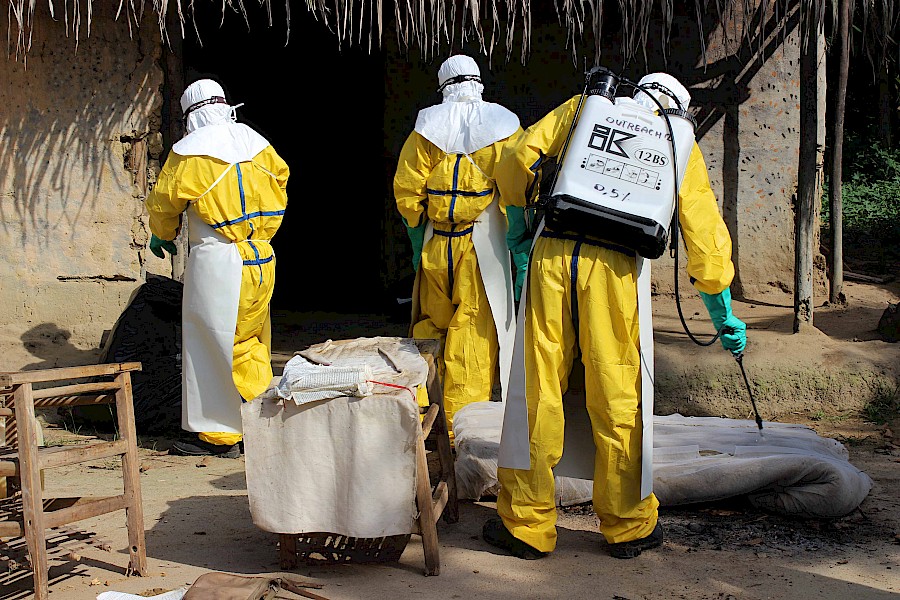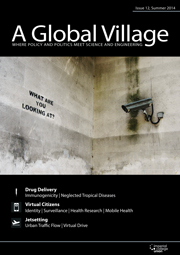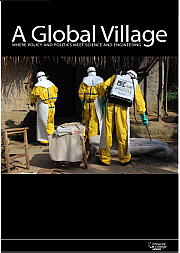Submissions
A Global Village focuses on key areas where international policy and politics meet science and engineering - it is a voice for faculty, graduates and students making a difference around the world, from global health to climate change and energy, food security and development.
Submissions are invited from students, graduates and faculty from Imperial College and affiliated universities, organisations and enterprises, and can be sent to
aglobalvillage@imperial.ac.uk.
The next submission deadline will be updated soon.
Previous topics include:
- The Virtual Citizen
The real world is becoming increasingly subsumed in the virtual as more individuals become continuously connected through an array of devices from computers, laptops, tablets, smartphones or even wearable devices. Digital social networks that span the globe have become established and are enabling new forms of citizen participation in areas such as politics, journalism, education and business. The cyber world is already having profound effects on culture, politics, economics and society and posing challenges in the areas of virtual identity, anonymity, privacy and security. This section will address the most important issues relating to this new frontier of society and the dual nature of its citizens who simultaneously inhabit the physical and virtual world.
- Drug Delivery Systems
Drug Delivery Systems is a term that encompasses the delivery of drugs to sites where they achieve maximum action. They are a fundamental component of modern medicine and as healthcare systems are becoming ever more influenced by pharmaceutical companies, their roles are set to increase. Now is a crucial time for developing new technologies to meet the universal challenges of population rise, climate change and the global sequelae of their associated diseases. However it is important to consider the economics, political issues and societal challenges that come with any novel form of healthcare implementation. This issue of A Global Village explores the key factors in this important area of medicine as we look towards new horizons.
- 21st Century Jetsetting
As urban populations continue to expand, ensuring efficient movement of people and goods between and within urban centres will be one of the major challenges of the 21st century. New and innovative infrastructure will be needed to meet growing demand for land, sea and air transport. The articles in this section will outline the scientific and technological developments taking place in the design of future urban infrastructure that will need to balance between improved journey times and capacity while reducing traffic congestion, costs and environmental impact. In the future, we may see self-driving cars, smart roads, new forms of mass transit, such as evacuated tube transport, and a new generation of quieter, more efficient aircraft.
Article submission: All submissions should have a word-count between 1,000-2,000 words. This should include a short abstract summarising the article and the discussion to be put forward. The article should be written for lay readers, and so not include scientific jargon unless it has been defined and explained. Please also include a maximum of 10 references, in the style outlined below, and a short biography (max. 2 sentences). Accompanying photographs/graphics are also welcome although we cannot guarantee they will be used. However, we do require that images are of high resolution (min 1800 pixels wide).
Editing process: Your article will go through our editorial process, and approximately 10 days week after submission, comments will be communicated back to the author. A second draft should then be submitted within 10 days of receipt of comments. If your article is accepted, we will then go through theFor more specific information on the type of piece we are looking for please read the relevant section below and refer to previous issues for an idea of the tone/style of A Global Village.
Faculty and Young Researchers
Established members of faculty and young researchers from both Imperial College and international universities are invited to write pieces rooted in policy and politics related to their field of research.
Recent Graduates
We are particularly interested to hear from recent graduates of Imperial College and other universities who are now working both at a national and international level in policy and politics for science-related issues.
Maybe you would like to challenge the scientific community to answer some of the questions your organisation/employer tackles everyday?
Students
Both undergraduate and graduate students are invited to submit pieces on topics related to policy and politics particularly those with a scientific connection. We specifically urge contributors to write in fields they have first-hand knowledge of, and is at least loosely related to their field of research.










